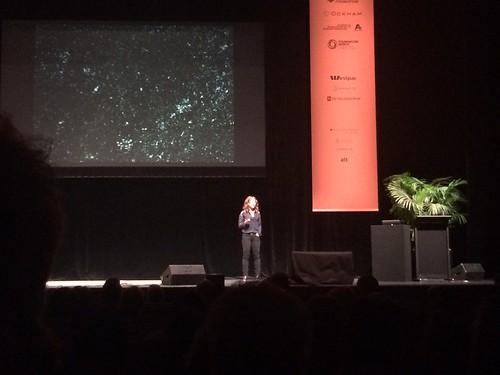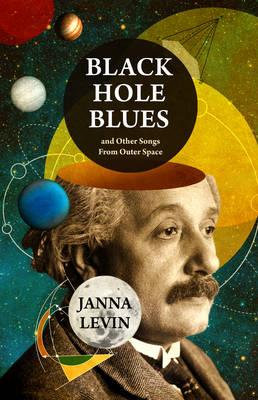I am concerned, as I enter the main auditorium at the Aotea Centre, on the last day of the Auckland Writers Festival, that I may not have the brain power left to fully appreciate a session on Gravitational Waves. It's been a long festival and I think I may have already overstuffed my brain with Big Ideas and Deep Thoughts.
As a yawn escapes, I'm expecting the worst.
Fortunately Janna Levin is a brilliant and engaging communicator. I needn't have worried. I'm able to follow the concept of waves in gravity, caused by the distant collision of black holes... quite well, actually. She throws a couple of oranges around, as a way of demonstrating how gravity curves spacetime (without gravity, the trajectory of a thrown orange would be a straight line), and this unexpected kineticism helps cement the idea.
Basically she's explaining the science and significance of the big scientific announcement we all remember from February of this year but which most of us are a bit unclear about, in terms of what it all means. Thanks to Professor Levin, I understand a lot more about this.
The actual working behind all these ideas requires the kind of maths that most of us find bewildering - fortunately we have people like Janna Levin to do all that complicated numbers stuff and happily almost none of that makes it into her presentation. Instead she peppers her talk with a range of pop culture references (Third Rock from the Sun, Alien, Doctor Who).
In particular, this OK GO music video, filmed in a single take on a gravity defying "vomit comet" as she calls it, shows us what gravity actually is - namely falling. Falling towards a mass, in our case, the Earth (which is itself falling through space in an orbit around the sun). Most of us think about gravity in the wrong way, as the landing.
[youtubehttps://youtu.be/D3LBvh07a1I
Though the music video above could make you believe otherwise, gravity is actually quite a weak phenomenon (compared to light, for instance) and therefore difficult to detect. We feel its effects here on Earth, of course, but if a gravitational wave originating in a far off galaxy were to pass through you now, would you even notice?
The answer is it has and you didn't. But luckily scientists have been trying to record such an event for a while now and on September 14, 2015 at 5:51 a.m. Eastern Daylight Time (09:51 UTC) two installations called Laser Interferometer Gravitational-wave Observatories (LIGO), one in Louisiana, the other in Washington State, recorded gravitational waves from the collision of two black holes that happened 1.3 billion years ago.
How? Well, they do it with mirrors...and a laser inside a 4km long concrete vacuum.
Imagine two ships bobbing on a calm ocean with a taut rope between them. Should a wave come along you'd be able to detect a change in the relative positions of the boats because of the movement of the rope. In this case, the boats are mirrors and the rope is a laser, and there's two of these pairs stationed 3000km apart in America. And I'm sure it's a lot more technical than that (and involves a lot of maths) but that's the basic idea of how you detect gravitational waves. The sound of these gravitational waves is within an audible range. If they weren't so very weak and quiet, you'd be able to hear them.
After months of checking and re-checking the maths, they made their announcement on what they'd found earlier this year.

Questions at the end of the session wondered about the possibility of multiple universes - most scientists working in this area seem to think this is likely - and one older gentleman went well out of scientific realms and into spurious sociology remarking that Levin was "a very attractive woman" and was therefore surprised that she'd be interested in science and maths since, in his opinion, those two things didn't go together very often.
At this point you could actually feel the rest of the audience cringing and trying to collapse in on itself, like so many black holes.
Fortunately Levin had a fantastic answer for this which she communicated in a straightforward manner - if society tells women that their purpose is to be attractive, and you've already achieved that then why would you do anything else? But that's not what it was like at her house.
A complex idea, communicated simply. Just like the rest of her lecture.
Find out more
-
 Titles by Janna Levin in our catalogue
Titles by Janna Levin in our catalogue
- Professor Janna Levin on Dara O'Briain's Science Club (access in a library or enter your library card & password/PIN)
- BBC Horizon "Aftershock: The Hunt for Gravitational Waves" (access in a library or enter your library card & password/PIN)
- Find out more about the Auckland Writers Festival 2016
- Browse all our Auckland Writers Festival posts
- Read Masha, Moata and Roberta’s Auckland Writers Festival 2016 recommended booklist
- See photos from the Festival



Add a comment to: Janna Levin and a matter of some gravity – Auckland Writers Festival 2016